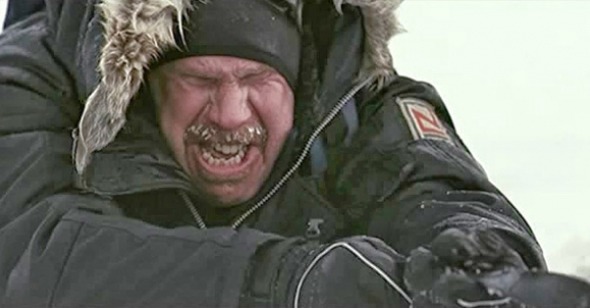Cold Comforts
By Andrew Tracy
The Last Winter
Dir. Larry Fessenden, IFC Films, U.S.
Horror is the most overburdened genre in existence, weighed down with so much symbolic, political, and sociological portent that it’s a marvel when a film can actually get down to the business of being scary. While unpretentious and well-crafted efforts like Rob Schmidt’s Wrong Turn fall by the wayside, the latest offerings from each newly minted horror “auteur” come with allegory locked firmly in place for critical exegesis, while any actual insight into their ostensible “real” topic is precisely nil. This isn’t to say that horror films are obliged to stay out of the real world and within their own supposed generic boundaries—rather that an attempt to address the real world must be made intrinsic to those boundaries, a part of the film rather than an imposed reading.
Larry Fessenden is a self-confessed horror filmmaker, and not only perhaps the greatest one working today—his potential rivals being Kiyoshi Kurosawa and Bong Joon-ho—but also the most pointedly political, emotionally invested, and unguardedly honest. Unlike his dissembling contemporaries, his films are defiantly about what they are about. Rather than the comfortable “archetypes” with which so many horror faux-teurs skim across any real investment in their material, Fessenden always has an actual subject, whether it’s the self-destruction of addiction in Habit or the familial breakdown of Wendigo, and it’s from these subjects that the atmosphere and fright emanate. Fessenden is not making art movies (or political tracts) in horror-film clothing, but employing the genre to break open the dread at the heart of his subjects, to give their terrifying formlessness a transitory form.
In The Last Winter, his most ambitious and masterful film thus far, he deliberately pushes the capabilities of cinematic representation to incarnate that unimaginable fear. The familiar scenario—an oil-drilling team in Alaska suddenly confronted by strange atmospheric conditions and various ghostly presences circling their camp—and familiar character types—he-man foreman (Ron Perlman), sensitive, bearded scientist (James LeGros), smart and tough woman caught between them (Connie Britton), the grubby, bearded, talkative mechanic, inevitably named Motor (Kevin Corrigan)—promises a better-or-worse rerun of familiar pleasures, with a trendy overlay of environmental doomsaying. But Fessenden continually undercuts both the expected progression of shocks—stifling or cutting short the expectedly scary bits and introducing jagged rhythms and unsettling discrepancies into what should be the rest periods between scares—and the comfy, audience-flattering “higher” thematic content. Fessenden is not praising our sharpness in divining the “real” subject of his film beneath the generic trappings. He is using those trappings to their fullest in order to burst through them, penetrating our distanced genre connoisseurship and striking us at our most naked, vulnerable, fearful point: the very real possibility of human extinction buried beneath the endless “debate” over irreversible ecological breakdown.
This must be made clear: The Last Winter is not an allegory of ecological apocalypse, but an envisioning of it. While its plot outline fits it snugly into the eco-horror/revenge-of-nature subgenre, it allows the audience no distancing from its truly terrifying topic. Hopelessness has been made just another exploitable trope in the horror genre, a cheap shock for the final reel (see the remade Dawn of the Dead or the recent, execrable 28 Weeks Later); for Fessenden, it is the shaping force of his film. Not that he is in any way a nihilist: with his warmly drawn characters, he’s the most humanistic of horror filmmakers, if that’s not a contradiction in terms. The unavoidable fates that befall his characters in The Last Winter are both tragic and deserved. His people are not merely unlucky representatives of humanity arbitrarily chosen for nature’s punishment, they are members of humanity whose own actions and thoughts, however ill- or well-intentioned, have contributed to the destruction being unleashed from within the much-abused earth. And the forms that destruction takes are frightening not only because they are expertly and unnervingly directed by Fessenden, but because they increasingly become disconnected from any discernible “rules”—working within the boundaries of genre, they begin to move beyond the safety afforded the viewer therein. What is inexplicable to the characters should by all rights be explicable to us, but for one of the few times in horror cinema, we are presented with a situation where we honestly don’t know what to expect next. And combined with the gathering portents of a horrible revelation to come, we are faced with a situation both fearful and hopeful: the chance that we might see something genuinely new, a rarity not just for horror cinema but any cinema.
There are thus two levels of suspense created and maintained throughout The Last Winter. The first is Fessenden’s, in his often brilliant command of mood, atmosphere, and timing; the second is ours, as we wonder, hope, that the revelation can possibly equal the masterful build-up Fessenden has given it. To put it simply, it doesn’t. But the gonzo insanity of the last ten minutes, so drastically breaking with the slow, gathering dread that preceded it, almost seems a humble confession on the director’s part: a confession that nothing he puts on the screen could possibly be more frightening than the reality he’s concerned with. The Last Winter ultimately isn’t “satisfying” because there is no real-world satisfaction for what it speaks of. This horror cannot be contained in our stories or our images. It has a logic of its own so alien to ours that even our best attempts to decipher it must fail, and our knowledge be limited to an awareness of its implacable approach. Hoots and jeers might accompany the finale of The Last Winter, but they’re only a coping mechanism for the terrible truth it uncovers—what it knows about that which is impossible to know.
